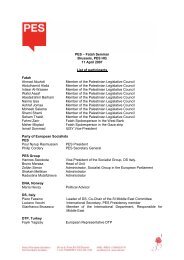Hedge funds and Private Equity - PES
Hedge funds and Private Equity - PES
Hedge funds and Private Equity - PES
Create successful ePaper yourself
Turn your PDF publications into a flip-book with our unique Google optimized e-Paper software.
154<br />
But if we in Europe – <strong>and</strong> hopefully globally – can regulate the financial markets to make them<br />
subordinate to the real economy, without negative implications, there are enormous realeconomic<br />
opportunities ahead of us, for the future of the whole of Europe’s of population.<br />
That is why we need a new strategy for the financial markets in member states <strong>and</strong> the European<br />
Union.<br />
Part III is going to focus on possible legal instruments for responding to the impact of private<br />
equity fund <strong>and</strong> hedge fund ownership. The various consequences of their investment strategies<br />
range from declining tax revenues <strong>and</strong> offshore placement, lack of transparency <strong>and</strong> loss of information,<br />
reducing the capacity of target companies to invest, encouraging job cuts <strong>and</strong> worsening<br />
working conditions, an aggravated long-term investment situation <strong>and</strong> risks for financial stability.<br />
Taking into account these negative consequences it is crucial to recognise that something has<br />
to be done in order to protect the European market economy <strong>and</strong> European society in general.<br />
But not only “to protect” – first <strong>and</strong> foremost in order to create the conditions for realising the<br />
enormous potential for smart, green growth <strong>and</strong> new, better jobs ahead of us.<br />
In this part, legal instruments, incentives <strong>and</strong> proposals for regulation will be presented in<br />
connection with specific policy areas like taxation, corporate governance, social responsibility,<br />
supervision, etc. In addition, we want to underline that ideally each proposal should be examined<br />
for its national <strong>and</strong> EU-level implications. There is no single combination of regulations that<br />
can answer all the new challenges. Instead they need a coherent mix of over national, European<br />
<strong>and</strong> possibly global levels, as these <strong>funds</strong> are operating worldwide. Therefore where no competence<br />
is granted to the EU, we would encourage national action, based on common ground, to<br />
promote a common approach <strong>and</strong> avoid harmful competition. A successful concept designed<br />
at national level should serve as an example to other countries, whatever the policy area touched<br />
upon. The example of the US system should be kept in mind as regulation on such issues is<br />
centralised <strong>and</strong> quite efficiently implemented.<br />
To play down any need for public inquiry the HF <strong>and</strong> PE industries claim: “we are efficiencyenhancing”.<br />
This contention is repeated ad nauseam. It is supposed to be self-evident <strong>and</strong> is<br />
thus br<strong>and</strong>ished like a talisman against any attempt to discuss the opportunity of shedding some<br />
light on HF <strong>and</strong> PE for the sake of the lay investor.<br />
But the efficient market hypothesis (EMH) is beyond the reach of any empirical evidence. So, if<br />
HFs <strong>and</strong> PEs enjoy the unique privilege of always being efficiency-enhancing, it follows that they<br />
should not be investigated, or transparent, or regulated.<br />
In their investment strategies, hedge <strong>funds</strong> either make directional bets on futures markets or on<br />
the future values of macroeconomic variables, or exploit price inefficiencies, or exploit specific<br />
situations (event-driven, merger arbitrage, distressed securities). To support the contention that<br />
hedge <strong>funds</strong> are always efficiency-enhancing one must demonstrate that they always have incentives<br />
to act as contrarians. Therefore pro-HF <strong>and</strong> PE supporters go on repeating the following<br />
assertions:<br />
In their directional bets on future market trends, they take advantage of mean-revertingprocesses<br />
<strong>and</strong> subsequently enforce adjustment to price equilibrium.<br />
In bridging the gaps between segments of markets that would be too shallow or even nonexistent<br />
without them, they contribute to completeness in the whole set of markets.<br />
In bringing liquidity in corporate deals that are always beneficial for the economy as a whole,<br />
they not only contribute to market efficiency, but also to economic efficiency.




